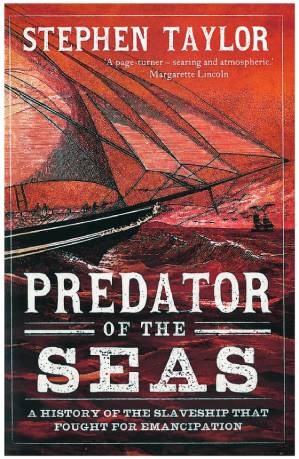Engrossing ship history of a slave transporter-turned-liberator
Predator of the Seas, by Stephen Taylor
 A ship biography like no other, Predator of the Seas has a fascinating subject – the Black Joke, which surely stands out as one of the most remarkable vessels of all time.
A ship biography like no other, Predator of the Seas has a fascinating subject – the Black Joke, which surely stands out as one of the most remarkable vessels of all time.
The Baltimore clipper was named the Henriqueta under Portuguese ownership, and it trafficked more than 3,000 captives to Brazilian plantations. These vessels were the racehorses of the sea, and were prized by slave traders for their speed, ease of manoeuvre and relatively shallow draft – qualities that allowed them to navigate close to the African coast while bringing slaves onboard, and to outrun British ships.
Henriqueta was later captured by the Royal Navy's Preventative Squadron, which was tasked with suppressing the slave trade following its abolition by the British government in 1807. The vessel was renamed and re-crewed by Royal Navy seafarers and West African Kru people who served ably alongside their British counterparts and were also able to withstand the tropical diseases that killed Europeans by the score.
The Black Joke's swiftness proved a decisive advantage compared with the more cumbersome RN vessels, and it freed 3,692 captive Africans during its second career.
Not only that, the ship became an icon in the fight against the slave trade and a favourite with the public.
Much ink has been expended during recent years on the subject of slavery, but this book is something rather special. The double career of Henriqueta/Black Joke as slave ship and enforcement vessel allows the author to explore this dark subject in all its complexity and ambiguity, as well as its brutality.
This is also an extremely well-written book, a historical page-turner with engaging accounts of naval battles that also leaves you with a broad understanding of the subject. The author presents a wide range of perspectives, from the slaveowners of Brazil and the captains and crew that supplied them, through to the slaves themselves, the Dahomey elites of West Africa who captured them for sale to the Europeans, the veterans of the Napoleonic wars who tried to prevent the trade, and the Africans who served onboard the Black Joke.
As Stephen Taylor writes in his introduction, in telling this story 'the life of a single vessel that occupied both these worlds evolved into a metaphor for the paradoxes of humanity'.
Predator of the Seas
By Stephen Taylor
Yale University Press, £25
ISBN: 978 03002 63992
Buy this book in the Nautilus Bookshop
While you're there, why not browse the rest of the titles in our unique maritime bookshop, which sells all the books reviewed on these pages.
Buy nowMore Books
How to 'make it' in the superyacht industry
Superyacht Success, by Brendan O'ShannassyBack in 2022, we reviewed Brendan O'Shannassy's memoir Superyacht Captain. Now Capt O'Shannassy has returned with a new book that focuses on how crew can navigate their careers.
Love for seafaring conquers all
No Quitting, by Andrea BarkerAndrea Barker's memoir of her 1990s Merchant Navy cadetship tells of her eagerness and determination to follow the career pursued by generations of her family. Unfortunately, there were choppy waters ahead...
Radio revelry
Barques, Sparks and Sharks, by Len WilsonSeafarers are known for their story-telling abilities, and Orkney-born Len Wilson does not disappoint in this memoir of his years as a radio officer
Mastering our harbours
Harbours and Their Masters, by Mark Ashley-MillerNovice skipper Mark Ashley-Miller recently spent five years circumnavigating the UK and Ireland as a charity challenge – interviewing and photographing the harbour masters he met along the way.
